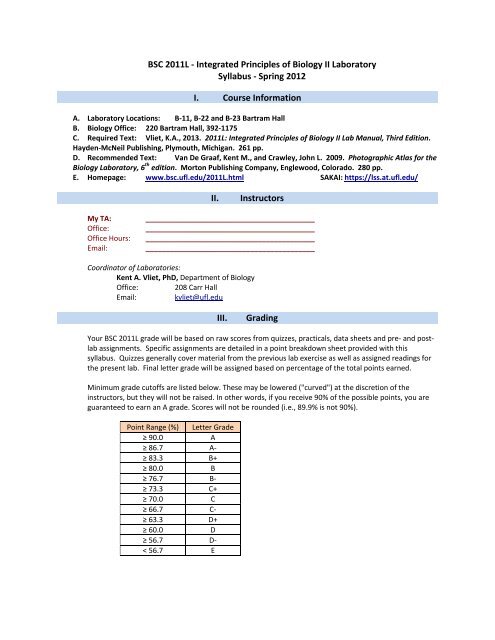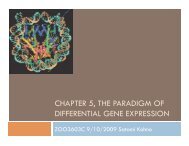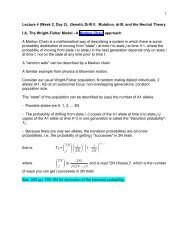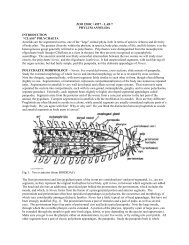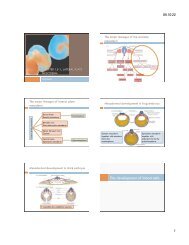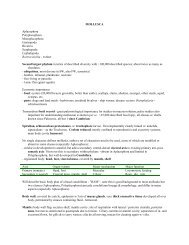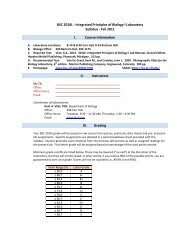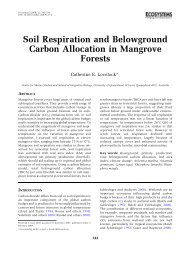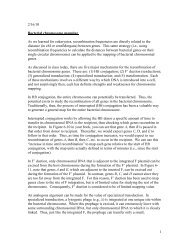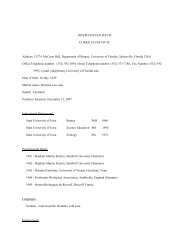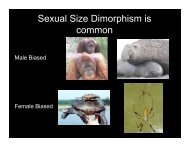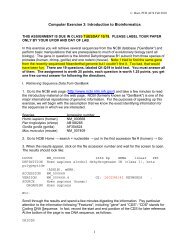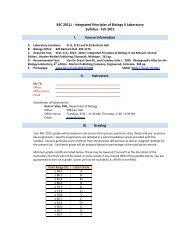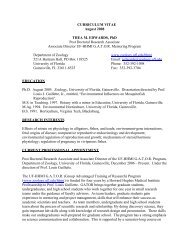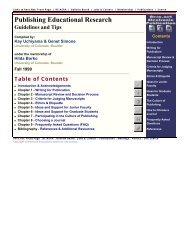Integrated Principles of Biology II Laboratory Syllabus - Spring 2012 ...
Integrated Principles of Biology II Laboratory Syllabus - Spring 2012 ...
Integrated Principles of Biology II Laboratory Syllabus - Spring 2012 ...
Create successful ePaper yourself
Turn your PDF publications into a flip-book with our unique Google optimized e-Paper software.
BSC 2011L ‐ <strong>Integrated</strong> <strong>Principles</strong> <strong>of</strong> <strong>Biology</strong> <strong>II</strong> <strong>Laboratory</strong><br />
<strong>Syllabus</strong> ‐ <strong>Spring</strong> <strong>2012</strong><br />
I. Course Information<br />
A. <strong>Laboratory</strong> Locations: B‐11, B‐22 and B‐23 Bartram Hall<br />
B. <strong>Biology</strong> Office: 220 Bartram Hall, 392‐1175<br />
C. Required Text: Vliet, K.A., 2013. 2011L: <strong>Integrated</strong> <strong>Principles</strong> <strong>of</strong> <strong>Biology</strong> <strong>II</strong> Lab Manual, Third Edition.<br />
Hayden‐McNeil Publishing, Plymouth, Michigan. 261 pp.<br />
D. Recommended Text: Van De Graaf, Kent M., and Crawley, John L. 2009. Photographic Atlas for the<br />
<strong>Biology</strong> <strong>Laboratory</strong>, 6 th edition. Morton Publishing Company, Englewood, Colorado. 280 pp.<br />
E. Homepage: www.bsc.ufl.edu/2011L.html SAKAI: https://lss.at.ufl.edu/<br />
<strong>II</strong>.<br />
Instructors<br />
My TA:<br />
Office:<br />
Office Hours:<br />
Email:<br />
__________________________________________<br />
__________________________________________<br />
__________________________________________<br />
__________________________________________<br />
Coordinator <strong>of</strong> Laboratories:<br />
Kent A. Vliet, PhD, Department <strong>of</strong> <strong>Biology</strong><br />
Office: 208 Carr Hall<br />
Email: kvliet@ufl.edu<br />
<strong>II</strong>I.<br />
Grading<br />
Your BSC 2011L grade will be based on raw scores from quizzes, practicals, data sheets and pre‐ and postlab<br />
assignments. Specific assignments are detailed in a point breakdown sheet provided with this<br />
syllabus. Quizzes generally cover material from the previous lab exercise as well as assigned readings for<br />
the present lab. Final letter grade will be assigned based on percentage <strong>of</strong> the total points earned.<br />
Minimum grade cut<strong>of</strong>fs are listed below. These may be lowered ("curved") at the discretion <strong>of</strong> the<br />
instructors, but they will not be raised. In other words, if you receive 90% <strong>of</strong> the possible points, you are<br />
guaranteed to earn an A grade. Scores will not be rounded (i.e., 89.9% is not 90%).<br />
Point Range (%) Letter Grade<br />
≥ 90.0<br />
A<br />
≥ 86.7 A‐<br />
≥ 83.3 B+<br />
≥ 80.0<br />
B<br />
≥ 76.7 B‐<br />
≥ 73.3 C+<br />
≥ 70.0<br />
C<br />
≥ 66.7 C‐<br />
≥ 63.3 D+<br />
≥ 60.0<br />
D<br />
≥ 56.7 D‐<br />
< 56.7 E
Note that the current UF policy for assigning grade points is available at the following undergraduate<br />
catalog web page: http://www.registrar.ufl.edu/catalog/policies/regulationgrades.html.<br />
IV.<br />
Lab Supplies<br />
Dissecting kit (small probe and seeker, fine dissecting scissors, fine point forceps, scalpel with replaceable<br />
blade, teasing needles). The Campus Shop, the Florida Bookstore, and University Book and Supply should<br />
carry good kits with these items. All <strong>of</strong> these supplies must be furnished by the student. They will not be<br />
available in lab.<br />
V. Reading Assignments<br />
You should review fully each laboratory assignment prior to the laboratory period. In most cases you will<br />
be unable to complete the observations and experiments fully and efficiently during the lab period unless<br />
you know exactly what is to be done before you walk into the laboratory. Reading assignments are<br />
included in this syllabus. Weekly quizzes are based partially on the reading assignments.<br />
VI.<br />
Expectations<br />
Each student is solely responsible for reading and following the instructions, guidelines and schedules in<br />
this syllabus. Not having read the information in this syllabus will not constitute an excuse for missing an<br />
assignment, exam or other assessment.<br />
V<strong>II</strong>.<br />
Lab Policies<br />
A. Excused absences<br />
You are expected to attend the lab section for which you are registered. If you miss your lab, notify your<br />
instructor immediately by e‐mail. You must have a valid, documented excuse for missing your regular lab<br />
section to be allowed to make up a lab without penalty. The validity <strong>of</strong> excuses for missed labs or<br />
assignments will be determined by your instructor. If you do not have documentation for missing your<br />
lab, you may be given the opportunity to makeup assignments <strong>of</strong> graded materials at the discretion <strong>of</strong><br />
your instructor. This work will be done outside <strong>of</strong> the laboratory and will be penalized 20% <strong>of</strong> the total<br />
points. In this case, missed quizzes cannot be made up. Missed labs generally must be made up within the<br />
same week. If you know in advance that you are unable to make your regular sections, contact your lab<br />
TA earlier in the week.<br />
B. Illness<br />
If you are ill with an infection that may be contagious by casual contact (e.g., a cold or flu), you should not<br />
attend class. Furthermore, if you have a fever associated with any illness, you should not attend class until<br />
you have been free <strong>of</strong> fever for at least 24 hours. The instructor reserves the right to ask any student to<br />
leave the classroom at any time if there is a reasonable likelihood that the student's presence in the<br />
classroom places other students at substantial risk <strong>of</strong> infection.<br />
C. Assignment deadlines<br />
Graded assignments are due at the beginning <strong>of</strong> the lab session one week after the actual lab work was<br />
done, unless otherwise noted. Assignments turned in after the start <strong>of</strong> the lab session will be considered<br />
late work. NOTE: Students who attend a lab session other than their <strong>of</strong>ficially registered section and<br />
perform an experiment which require a data sheet or lab report must still turn in their work at the<br />
beginning <strong>of</strong> their <strong>of</strong>ficially registered section on the following week. If you are unable to turn in your<br />
work during your regular lab section and are not able to hand it in directly to your instructor, DO NOT<br />
leave an assignment at your instructor's <strong>of</strong>fice. Rather, (1) make a photocopy <strong>of</strong> your lab report for
safekeeping and (2) hand in the original to the staff <strong>of</strong> the departmental <strong>of</strong>fice (220 Bartram Hall) during<br />
regular <strong>of</strong>fice hours (8 a.m.‐ 4 p.m.).<br />
D. Late work<br />
Late work will be penalized 10% <strong>of</strong> the total points per day (weekends, i.e., Friday to Monday, are counted<br />
as two days and U.F.‐recognized holidays are not counted). NOTE: The weekends preceding and following<br />
the Semester Break holidays will be counted.<br />
E. Participation<br />
Students may be allowed to turn in assignments on which they did not participate in the collection <strong>of</strong><br />
data, at the discretion <strong>of</strong> the lab instructor. These assignments will be penalized 20% <strong>of</strong> the points.<br />
F. Lab cleanliness<br />
No food or drink is permitted in the labs and students are expected to leave the lab as clean and orderly<br />
as it was when they arrived for class. NOTE: All scraps <strong>of</strong> paper, paper towels, broken cover slips and<br />
slides, masking tape, and any other trash must be properly disposed <strong>of</strong> by the students themselves.<br />
G. Lab attire<br />
Students are not allowed to wear sandals or open‐toed shoes in the laboratories.<br />
V<strong>II</strong>I.<br />
Academic Honesty<br />
All students registered at the University <strong>of</strong> Florida have agreed to comply with the following statement:<br />
“I understand that the University <strong>of</strong> Florida expects its students to be honest in all their academic work. I<br />
agree to adhere to this commitment to academic honesty and understand that my failure to comply with<br />
this commitment may result in disciplinary action up to and including expulsion from the University.”<br />
In addition, on all work submitted for credit the following pledge is either required or implied:<br />
“On my honor I have neither given nor received unauthorized aid in doing this assignment.”<br />
If you witness any instances <strong>of</strong> academic dishonesty in this class, please notify the instructor or contact<br />
the Student Honor Court (392‐1631) or Cheating Hotline (392‐6999). For additional information on<br />
Academic Honesty, please refer to the University <strong>of</strong> Florida Academic Honesty Guidelines at:<br />
http://www.dso.ufl.edu/judicial/procedures/academicguide.html.<br />
IX.<br />
Accommodations for Students with Disabilities<br />
Students who will require a classroom accommodation for a disability must contact the Dean <strong>of</strong> Students<br />
Office <strong>of</strong> Disability Resources, in Peabody 202 (phone: 352‐392‐1261). Please see the University <strong>of</strong> Florida<br />
Disability Resources website for more information at: http://www.dso.ufl.edu/drp/services/. Note that<br />
the student should provide documentation <strong>of</strong> a requirement for accommodation by the second week <strong>of</strong><br />
labs. No accommodations are available to students who lack this documentation. It is the policy <strong>of</strong> the<br />
University <strong>of</strong> Florida that the student, not the instructor, is responsible for arranging accommodations<br />
when needed. Once notification is complete, the Dean <strong>of</strong> Students Office <strong>of</strong> Disability Resources will work<br />
with the instructor to accommodate the student.<br />
X. Counseling Center<br />
Many students experience test anxiety and other stress related problems. “A Self Help Guide for<br />
Students” is available through the Counseling Center (301 Peabody Hall, 392‐1575) and at their web site:<br />
http://www.counsel.ufl.edu/.
XI.<br />
<strong>Laboratory</strong> Schedule<br />
<strong>Laboratory</strong> topics and reading assignments for this course are listed below. This is a tentative schedule;<br />
the dates and coverage <strong>of</strong> specific topics are subject to change.<br />
Week Week <strong>of</strong> <strong>Laboratory</strong> Topic Reading Assignment<br />
1 9 Jan **** NO LABS ****<br />
2 16 Jan **** NO LABS ****<br />
3 23 Jan Introduction; Plant Diversity Chapter 7<br />
4 30 Jan Photosynthesis Chapter 6<br />
5 6 Feb Plant Anatomy Chapter 8<br />
6 13 Feb Deuterostomes/ Cladistics Chapters 1 & 2<br />
7 20 Feb Fetal Pig Dissection<br />
Chapters 3 and 4<br />
*Bring your dissection kits*<br />
8 27 Feb Sensory Physiology / Library Exercise Chapter 5<br />
9 5 Mar **** NO LABS ****<br />
10 12 Mar Spatial Relations / Statistics Chapters 9 and 11<br />
11 19 Mar Population Ecology / Plan project Chapter 10 and 12 (pp. 203‐204)<br />
12 26 Mar Species Interactions Chapter 12 and Appendix A<br />
13 2 Apr Biodiversity Chapter 13<br />
14 9 Apr **** NO LABS ****<br />
15 16 Apr **** NO LABS ****<br />
16 23 Apr **** NO LABS ****
X<strong>II</strong>.<br />
<strong>Laboratory</strong> Assignment and Point Breakdown Sheet<br />
WEEK ASSIGNMENTS POINTS<br />
1 **** NO LABS THIS FIRST WEEK OF SCHOOL****<br />
2 **** NO LABS ****<br />
3 Plant Cladistics (Matrix): Complete the character state matrix on pp. 133‐135 <strong>of</strong> your<br />
manual.<br />
___/5<br />
4 LAB PRACTICAL 1 ___/10<br />
Photosynthesis (Data): Use the data you collect in lab to complete the<br />
Photosynthesis data sheet (pp. 99‐100). Keep this to use to complete the postlab<br />
activity and hand in with that assignment at the beginning <strong>of</strong> the next lab.<br />
___/15<br />
Photosynthesis (Postlab): Complete the postlab activity (p. 109) before coming to the<br />
next lab.<br />
___/10<br />
5 QUIZ 1 ___/10<br />
Plant Cladistics (Tree): Complete the data sheet on pp. 155‐156 <strong>of</strong> your lab manual. ___/5<br />
6 LAB PRACTICAL 2 ___/10<br />
Chordate Classification: Complete the cladistics worksheet on pp. 27‐33).<br />
___/13<br />
7 Fetal Pig (Prelab): Complete the fetal pig prelab activity (p. 53) before coming to lab. ___/2<br />
LAB PRACTICAL 3<br />
___/10<br />
Reproductive System: Complete the work sheet on pp. 67‐68.<br />
___/5<br />
8 Sensory Physiology (Prelab): Complete the sensory physiology prelab assignment on<br />
pp. 77‐80 before coming to lab.<br />
___/10<br />
LAB PRACTICAL 4<br />
___/10<br />
Sensory Physiology (Data): Complete the data sheet on pp. 81‐82.<br />
___/5<br />
Library Exercise: Complete a work sheet on pp. 83‐86. This will be due at the<br />
beginning <strong>of</strong> the following lab.<br />
___/5<br />
9 **** NO LABS ****<br />
10 Spatial Relations (Prelab): Complete the prelab activities (pp. 191‐192) before<br />
coming to lab.<br />
___/10<br />
QUIZ 2<br />
___/10<br />
Spatial Relations (Data): Prepare a statistical analysis and discussion <strong>of</strong> the results <strong>of</strong><br />
each <strong>of</strong> the three spatial tests (pp. 193‐196).<br />
___/15<br />
11 Population Ecology (Prelab): Complete the prelab assignment (pp. 169) prior to<br />
coming to lab.<br />
___/5<br />
QUIZ 3<br />
___/10<br />
Population Ecology (Lab sheet): Complete the lab sheet given out in lab.<br />
___/5<br />
Species Interactions (Planning): Complete the planning exercise for your Species<br />
Interaction project on pp. 203‐204.<br />
___/5<br />
Population Ecology (Postlab): Complete the Maximum Sustainable Yield activity (pp.<br />
179‐181) before the next lab. ___/10<br />
12 Species Interactions (Prelab): Read the assigned news article and answer questions<br />
(pp. 205‐206) before coming to lab.<br />
___/10<br />
QUIZ 4<br />
___/10<br />
Species Interactions (Data Collection): Complete the datasheet provided by your TA. ___/15<br />
Species Interactions (Postlab): Complete the postlab activity provided by your TA<br />
before coming to the next lab.<br />
___/10<br />
13 Biodiversity (Prelab): Complete the prelab assignment on p. 213‐214 before lab. ___/5<br />
Biodiversity (Data): Complete the data sheet on pp. 215‐218 in your lab manual. ___/10<br />
14 **** NO LABS ****<br />
15 **** NO LABS ****
16 **** NO LABS ****<br />
TOTAL POINTS:<br />
___/255
X<strong>II</strong>I.<br />
BSC <strong>Laboratory</strong> Safety<br />
Work in the <strong>Biology</strong> laboratory may expose students to inherently dangerous activities. Students in the<br />
BSC laboratories may be exposed to chemicals (e.g., formaldehyde, organic solvents, acids, and other caustic<br />
chemicals), chemical fumes, laboratory equipment and supplies (e.g., scalpels, razor blades, glass slides, coverslips,<br />
and electrical equipment), toxic or irritating properties <strong>of</strong> living and dead animals, and other materials necessary to<br />
laboratory activities. Other possible hazards include broken glass on the floor or counters, combustible materials,<br />
and slippery spills.<br />
1. Smoking, eating, and drinking are expressly forbidden and NOT allowed in the laboratory.<br />
2. Locate the placement <strong>of</strong> safety equipment and supplies in the laboratory: safety shower, eye wash<br />
station, fire extinguisher, and first aid kit. Memorize these locations. You should understand the use <strong>of</strong><br />
this equipment. Also note the locations <strong>of</strong> exits. Each laboratory has a chemical exposure manual. These<br />
include material safety data sheets on all hazardous chemicals or compounds to which you might be<br />
exposed in the BSC laboratory.<br />
3. Students should follow instructions carefully, especially when hazardous conditions occur or hazardous<br />
materials are being used.<br />
4. Students should dress appropriately in the lab. Gloves and protective aprons will be made available in the<br />
labs. Students may elect to supply their own gloves and protective aprons or laboratory coats. Only<br />
shoes that provide complete foot covering are allowed in the lab.<br />
5. You should be familiar with fire procedures. Leave the building immediately should a major fire occur or if<br />
the fire alarm sounds. Notify the appropriate authorities ‐‐ don't assume someone else remembered to<br />
do it. Meet with other students and your instructor outside the building before leaving so that an<br />
accurate headcount may be made.<br />
6. The safe use <strong>of</strong> specific equipment and tools (e.g., microscopes, slides, scalpels, and pipettes) will be<br />
demonstrated by the instructor during the laboratory sessions. Be sure you understand this usage and<br />
ask questions if you do not.<br />
7. Never pipette by mouth. Always use a suction bulb or pipette aid.<br />
8. Notify your T.A. IMMEDIATELY <strong>of</strong> any spills, breakages, or equipment malfunction.<br />
9. Students should report all hazardous conditions to the instructor immediately.<br />
10. All organisms, living or dead, should be treated with care and respect. Avoid direct handling when<br />
possible.<br />
11. Students should clean up any supplies used and should return materials where they belong as instructed.<br />
Any material spilled should be cleaned appropriately. Report any hazardous spills or breakages.<br />
12. Broken glass and sharp metal waste should be placed only in those receptacles marked for such disposal ‐‐<br />
do not put these materials in normal trash receptacles.<br />
13. Work areas must be left clean and dry prior to leaving the lab. Chemicals and reagents must be returned<br />
to their proper places.<br />
14. You should always wash your hands before leaving the laboratory, even if you have not knowingly come in<br />
contact with any chemicals or biological fluids.


